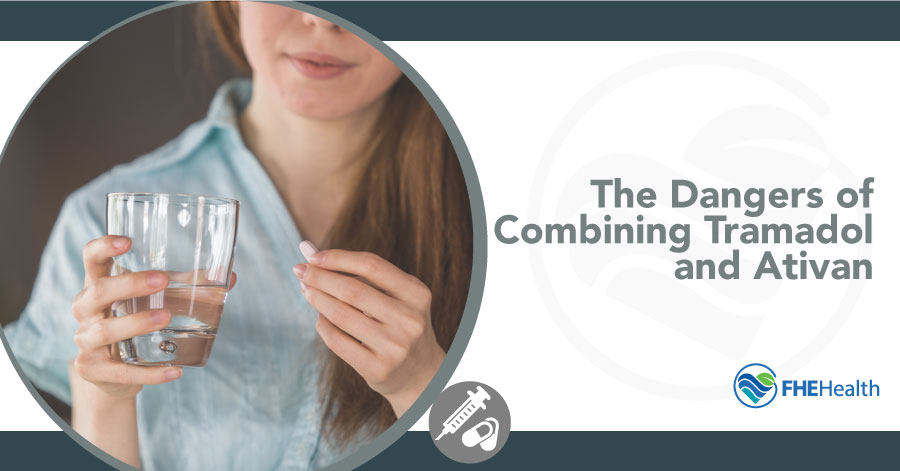
Ativan and Tramadol are two fairly common prescription medications that you may find together in your medicine cabinet at some point. While Tramadol is typically prescribed to manage symptoms of physical pain, Ativan is commonly prescribed for managing anxiety.
Tramadol is an opioid, and Ativan is a benzodiazepine. In 2019, 16% of opioid-related deaths also involved benzodiazepines, according to the National Institute on Drug Abuse. These two drugs aren’t meant to be used in combination, and if you find yourself mixing their use, especially without a prescription, it may be time to seek professional help.
What Is Tramadol?
Tramadol belongs to a class of drugs called opioids and is a narcotic-like pain reliever. Tramadol is usually prescribed by a doctor to treat moderate or severe pain in adults. It has a long release time, meaning it treats pain for an extended period, so it’s not meant to be taken on a short-term basis as you feel pain arise.
Because Tramadol is an opioid analgesic, it activates a neurotransmitter in the brain, releasing dopamine, which gives the user a sense of happiness or euphoria in combination with pain relief. As with other opioids, Tramadol is incredibly addictive, and some users are in danger of becoming addicted to the dopamine high associated with its use. It’s critical to note that even prescription dosages of Tramadol can be habit-forming, causing users to become dependent on the substance in an unhealthy way.
Side effects of using Tramadol can include:
- Constipation, nausea and vomiting
- Dizziness
- Drowsiness
- Headaches
Long-term pain management with Tramadol is generally considered safe if you take the dosage prescribed by your doctor.
What Is Ativan?
Ativan is the brand name for a benzodiazepine called lorazepam. Ativan comes in pill form and can also be administered via IV in a hospital setting. Ativan is generally used to manage anxiety disorders and works by slowing down your central nervous system. It increases the amount of gamma-aminobutyric acid (also known as GABA) in the brain to calm anxiety. GABA is a chemical that has a tranquilizing effect, so an increase of it in the brain helps calm the central nervous system.
While Ativan was once widely prescribed for anxiety, it’s now used to treat more extreme instances because of its potency and the possible side effects. When taking Ativan or generic lorazepam, the side effects can include:
- Dizziness
- Weakness
- Drowsiness
Less common side effects you could experience are:
- Depression
- Anxiety
- Nightmares
- Body aches
- Sweating
- Slowed breathing
Lorazepam is one of the most potent benzodiazepines available, which means there’s a real risk of developing a physical dependence on it if it’s not taken as prescribed.
How Ativan and Tramadol Interact
Ativan and Tramadol, or lorazepam and Tramadol, are both nervous system depressants, so using the two in combination could potentially amplify the side effects of each drug. This could create an unpleasant experience for the user at best and pose a serious health risk at worst.
Since Ativan is used to manage anxiety and Tramadol is used for pain management, you may be wondering what happens if you become injured while taking Ativan or develop anxiety while on pain medication. If you require pain relief while on lorazepam or anxiety management while on Tramadol, talk to your doctor about alternative medications that don’t interact and pose a risk to your health.
You should also refrain from drinking alcohol, self-medicating or taking other vitamins and medications while on either of these drugs unless you speak to your doctor about how that substance will interact with the opioid or benzodiazepine.
The Danger of Mixing These Drugs
Tramadol and Ativan shouldn’t be taken together, and using the two drugs at the same time, especially without a prescription, can have serious repercussions. Since both drugs depress the nervous system, you may experience severe drowsiness or sedation if they’re used in combination.
Other potential effects of Tramadol-Ativan interaction can include but aren’t limited to:
- Dizziness
- Difficulty focusing
- Lack of coordination
- Respiratory problems
- Slower reaction times
- Drowsiness
- Coma
More seriously, the side effects of using Ativan and Tramadol together can include addiction or an overdose. Addiction to one or both drugs is a very real possibility resulting from long-term use or a failure to adhere to the dosage prescribed by your doctor. If you overdose on a combination of the two substances, you could experience heart failure, respiratory failure, loss of consciousness or even death.
If you find yourself using both Tramadol and Ativan, especially without a prescription, it could indicate a bigger issue regarding substance abuse that requires professional intervention.
When to Seek Help
Some people become addicted to prescription medications through no fault of their own, and if you’re struggling with substance abuse, you don’t have to manage it alone.
The best way to treat an addiction to these substances is by visiting an accredited facility for drug and alcohol rehabilitation. You may need to stay at the facility for a detox period to manage withdrawal from the substance. Outpatient treatment is another viable option for many people who are addicted to benzodiazepines and want to seek help without staying on-site. While opioid treatment isn’t as common for outpatients because of the severity of the addiction, it may be a sequential step in the process of recovery.
At FHE Health, we understand that seeking help is the first step toward getting your life back on track, and we’re ready to fully support you in the journey to recovery. Whether you’re dealing with addiction to opioids, addiction to benzodiazepines or a combination of the two, we have treatment options that can help you. To learn more, contact us today at FHE Health by calling (833) 596-3502.






